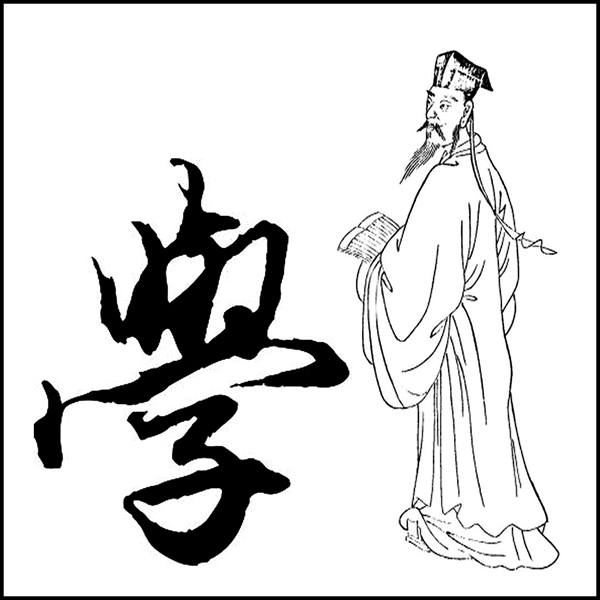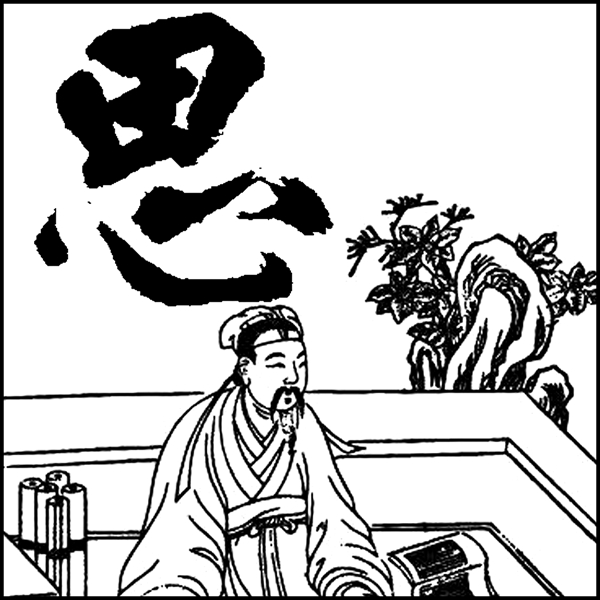引例 Citations:
学
/xué /
Learn

学习,儒家认为它是成就道德生命的一种修养和教化方式。一般意义上的“学”主要指对知识的理解和掌握,而儒家所言之“学”则更多指向道德品性的养成。个人通过后天对经典和礼法的学习以及对圣贤的效法,不断培养、完善自身的德性,以成就理想的人格。道家则反对“学”,如老子主张“绝学无忧”,认为“学”会带来内心不必要的忧虑,乃至破坏人的自然状态。
According to Confucianism, learning is the way to cultivate oneself to achieve moral integrity. The actual meaning of the term is to acquire knowledge and understanding, but for Confucianism it focuses more on the cultivation of moral and ethical qualities to achieve personal growth. Through learning classics and rites, and following the practices of sages, a person is able to cultivate and improve his moral standards and thus become a person of ideal qualities. Daoists, on the other hand, are against learning, and Laozi said that “fine-sounding arguments” only cause unnecessary worries, and can disrupt a person’s natural state of mind.
引例 Citations:
◎学而时习之,不亦说乎?(《论语·学而》)
(学习并按一定的时间实习所学的内容,不也是愉快的吗?)
Isn’t it a pleasure to learn and apply from time to time what one has learned? (The Analects)
◎君子博学而日参省乎己,则知明而行无过矣。(《荀子·劝学》)
(君子广博地学习并且每日检查反省自己,那么他就会智慧明达而行为没有过错了。)
A man of virtue learns extensively, reflects upon and examines himself every day; he thus becomes wise and knowledgeable, and conducts himself properly. (Xunzi)
思
/sī/
Reflecting/Thinking

心所具有的思考与辨别的能力。儒家认为“思”是人心所独有的重要功能。心能“思”,因此可以不像耳目之官一样被外物牵引或遮蔽。人只有通过心之“思”,才能发现内在于心的道德品性的根基,并由此通达于“天道”,从而确立人之所以为人的本质。如果缺少“思”的工夫,人将丧失其主体性与独立性。
The term means the ability to reflect and evaluate. Confucian scholars considered this a unique quality of the human mind. By reflecting, a person will keep himself from being led astray or getting confused by what he sees or hears. Through reflecting, a person will discover the foundation of morality. This leads to understanding natural laws, and eventually, the essence of being human. Without reflecting, humans will lose their individual consciousness and independence.
引例 Citations:
◎学而不思则罔,思而不学则殆。(《论语·为政》)
(只“学”而不“思”,则会迷茫昏乱;只“思”而不“学”,则会疑惑危殆。)
Learning without reflecting leads to confusion; reflecting without learning leads to danger. (The Analects)
◎耳目之官不思,而蔽于物,物交物则引之而已矣。心之官则思,思则得之,不思则不得也。此天之所与我者,先立乎其大者,则其小者不能夺也。(《孟子·告子上》)
(耳目这类器官不能“思”,因此为外物所蒙蔽,与外物接触便被牵引而去。心这一器官能“思”,“思”则有所得,不“思”则不能得,这是天赋予我的。先确立心作为大者的官能,如此则不会被耳目之官的欲望遮蔽。)
The eyes and ears cannot think, so they can be deceived or misled by external things. But the mind can think and reflect. Through reflection, cognition can be achieved, whereas without reflection nothing can be accomplished. This is the gift Heaven bestows on us. One should first establish the primacy of the mind, and then eyes and ears will not be misled. (Mencius)
Selected from Key Concepts in Chinese Thought and Culture published by Foreign Language Teaching and Research Press.